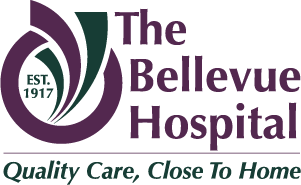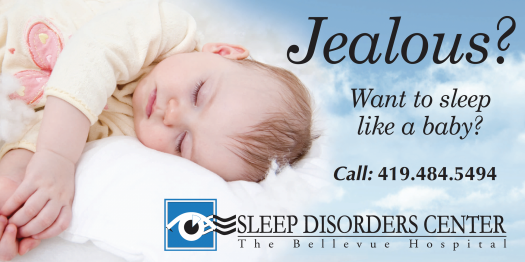Don’t be jealous of a good night’s sleep. The sleep professionals at The Bellevue Hospital Sleep Disorders Center will give you the information and treatment you need to help you sleep like a baby.
Sleep is as important as diet and exercise. Adequate sleep is part of a healthy lifestyle.
Lost sleep can result to daytime sleepiness that can affect our mood, behavior and performance. In effect, we are how we sleep. How we sleep affects who we are, what we do and how we do during the day. A night of seven to nine hours of restful, uninterrupted sleep becomes particularly important during times of high stress and anxiety.
Sleep disorders may lead to the following symptoms:
- Daytime Sleepiness
- Snoring
- Irritability
- Memory Loss
- Weight Gain
- High Blood Pressure
- Depression
- Morning Headaches
- Accidents
- Irregular Heartbeat
In order to help people address their sleep problems and their need for sleep, The National Sleep Foundation and The Bellevue Hospital's Sleep Disorders Center offer the below information about sleep problems and symptoms that can signal inadequate sleep.
Tips for helping people maximize the sleep they do get during times of high stress and anxiety:
- Don’t expect to fall asleep immediately after hearing or watching disturbing news. Stop listening or watching to news programs at least one hour before going to sleep.
- Engage in a relaxing, non-alerting activity at bedtime such as reading or listening to music. For some, soaking in a warm bath or hot tub can be helpful. Avoid activities that are mentally or physically stimulating.
- Do not eat or drink too much before bedtime. Alcohol is not a sleep aid; don’t use it to try to help you sleep.
- Only get into bed when you're tired. If you don’t fall asleep within 15 minutes, get out of bed, go to another room and engage in a relaxing activity such as reading. Return to your bed when you’re sleepy.
- Create a sleep-promoting environment that is quiet, dark, cool and comfortable.
- Consume less or no caffeine during the day. If you feel tired, substitute a short nap of 15-20 minutes for caffeine, but for people suffering from insomnia, daytime naps should be avoided.
- Avoid alcohol and nicotine, especially close to bedtime.
- Do not exercise within three hours of bedtime.
- Seek professional help if you are unable to deal with your sleeplessness and it is becoming a problem for you.
- Remember that sleeplessness associated with an acute stressful situation usually improves on its own. Be patient
Common sleep problems associated with times of stress and anxiety:
- Insomnia: characterized by difficulty falling asleep, waking up frequently during the night, waking up too early, or feeling unrefreshed upon waking.
- Seek the help of a physician if the problems persist for more than a few days.
- Nightmares: characterized by a terrifying and frightening dream.
- Can increase during periods of great stress for all people, although they occur most frequently in children ages 3 - 6 years.
- Avoid eating or taking high-dose vitamins before bed.
- Avoid alcohol, caffeine, or other stimulants.
- Excessive Daytime Sleepiness (EDS) and Fatigue: characterized by difficulty concentrating or dozing off while watching television or reading.
- Best handled by stopping what you are doing and taking a nap or going to sleep for the night.
- Speak to your family physician if symptoms persist for more than a few days.
Helping Children
At times of acute stress or trauma, parents and guardians should expect children to experience sleep problems regardless of their age. It may take the child a few weeks to return to normal sleep patterns.
Minimize the impact of stressful events on children for normal sleep patterns:
- Find out more about your child's concerns and talk about them.
- Try to avoid these conversations at bedtime, but don't shut them off if they happen.
- Talk briefly and offer to continue the conversation in the morning.
- Try to maintain your child's usual bedtime and bedtime routines.
- Avoid foods and beverages containing caffeine at least four hours before bedtime.
- Avoid exposure to television at least one hour before bedtime.
- If your child has trouble falling asleep, avoid a drastic response such as everyone sleeping together.
- Stay near the child and offer to check on them every now and then.
- Turn on a light in the hallway or next room, not in the bedroom.
- Music can provide a soothing noise.
- The presence of a family pet can be reassuring.
- If your child has a nightmare, don't have a long discussion about it.
- Be reassuring and help the child fall back to sleep.
- Talk about the dream in the morning.
- Set limits for your teenage children and keep them to a normal bedtime.
The Bellevue Hospital's Sleep Disorder Center has earned The Joint Commission's Gold Seal of Approval for Ambulatory Health Care Accreditation by demonstrating continuous compliance with its nationally recognized standards. This accreditation reflects The Bellevue Hospital's commitment to providing safe and effective patient care.
Contact Information
For more information please dial 419.483.4040 and the following extension.
| TBH Sleep Disorder Center | Ext. 5494 |
Sleep Disorder Resources

